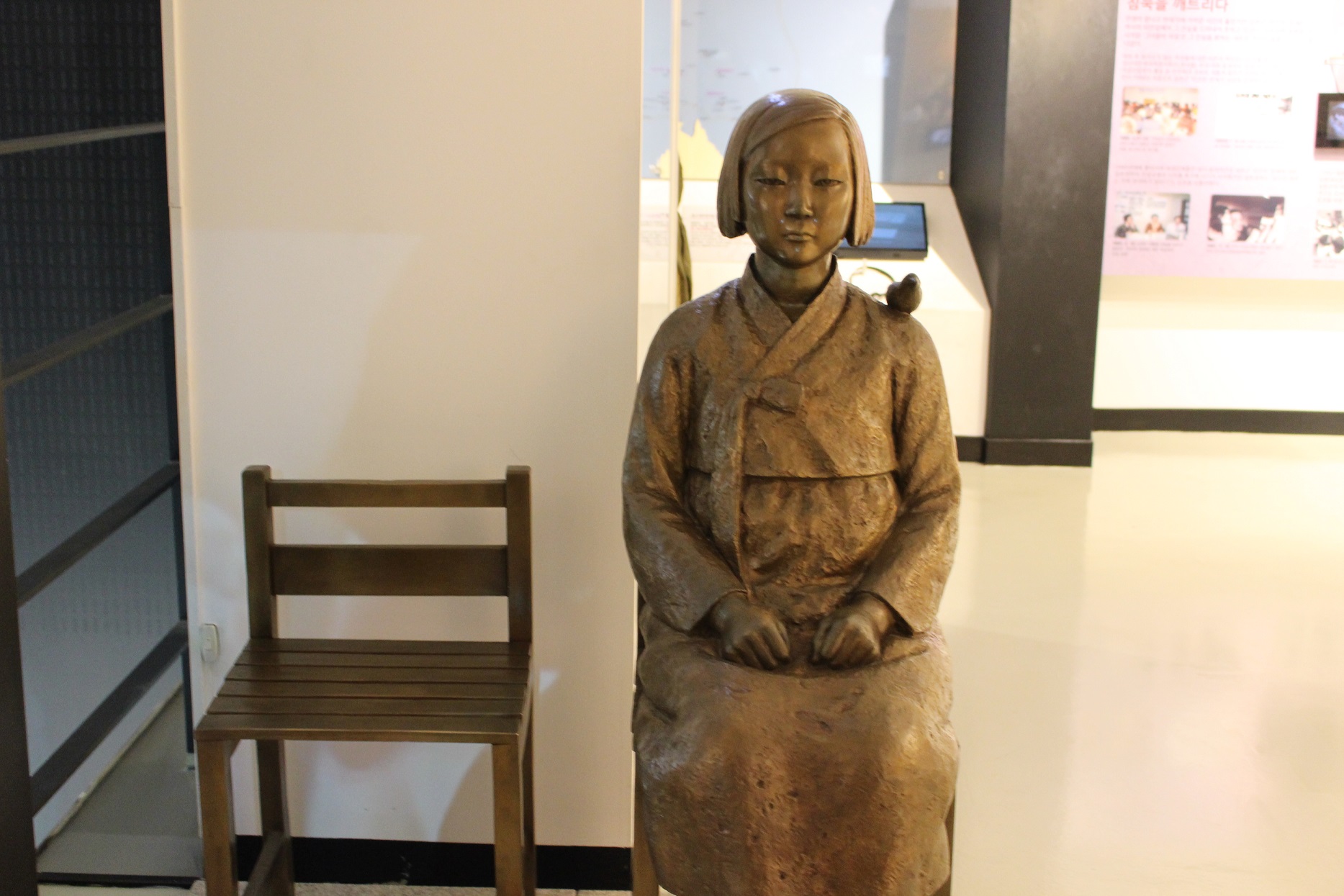 |
| ▲ A statue of Military Sexual Slavery girl |
On December 12, Korea and Japan reached an agreement regarding the practice of sexual slavery by the Japanese military during the Korean occupation. Negotiations have been target of constant controversy, but despite numerous setbacks, an agreement was eventually reached. Under the terms of the agreement, Japan admitted that it was their own fault and reflected on their conduct. Japan also agreed to refrain from any further criticism of international organizations such as the United Nations (UN) on this matter. Also as part of the settlement conditions, the Japanese government approved the erection of a monument honoring the memory of the so called ‘comfort women’ in front of the Japanese Embassy in Korea.
UN Secretary General Ban Gi-moon, supported the agreement. However, the settlement did not escape controversy. It seems nobody thought to ask the opinions of remaining victims. To make matters worse, a mere few weeks later, on January 31, the Japanese government released and an official position statement saying there was no evidence to prove that their military practiced sexual slavery. In doing so, the country violated the conditions of the agreement with Korea, once again worsening the relationship between the two countries.
Still today, Japan remains determined to deny any practice of sexual slavery by their military. Their barbaric history isn’t even acknowledged in schools and their government argues that they are unable to change school history curriculum. Their government-published textbooks are well-known for maintaining Dokdo is a Japanese territory and for minimizing their role and impact on Korea colonization. These actions serve as proof that Japan wants to erase their role in the practice of sexual slavery by their military by pursuing an agenda which denies their guilt with the UN even after the signing of this agreement.
The UN Committee on the Elimination of All Forms of Discrimination Against Women (CEDAW) held a meeting in Geneva on February 15. At the meeting, Japan insisted that there was no evidence for the Military Sexual Slavery. Commission to prove they committed any wrongdoing. The Commission was established in accordance with the recommendations of the CEDAW which assigned a deliberative role for group and required a periodic report with recommendations for each country. They have consistently called upon Japan to accept responsibility and to compensate the victims. International historians and even historians in Japan all agree that Japan must take responsibility for the atrocities they committed in the past and argue that there are still many victims alive today in Korea, China and other Asian countries that have provided evidence of their guilt.
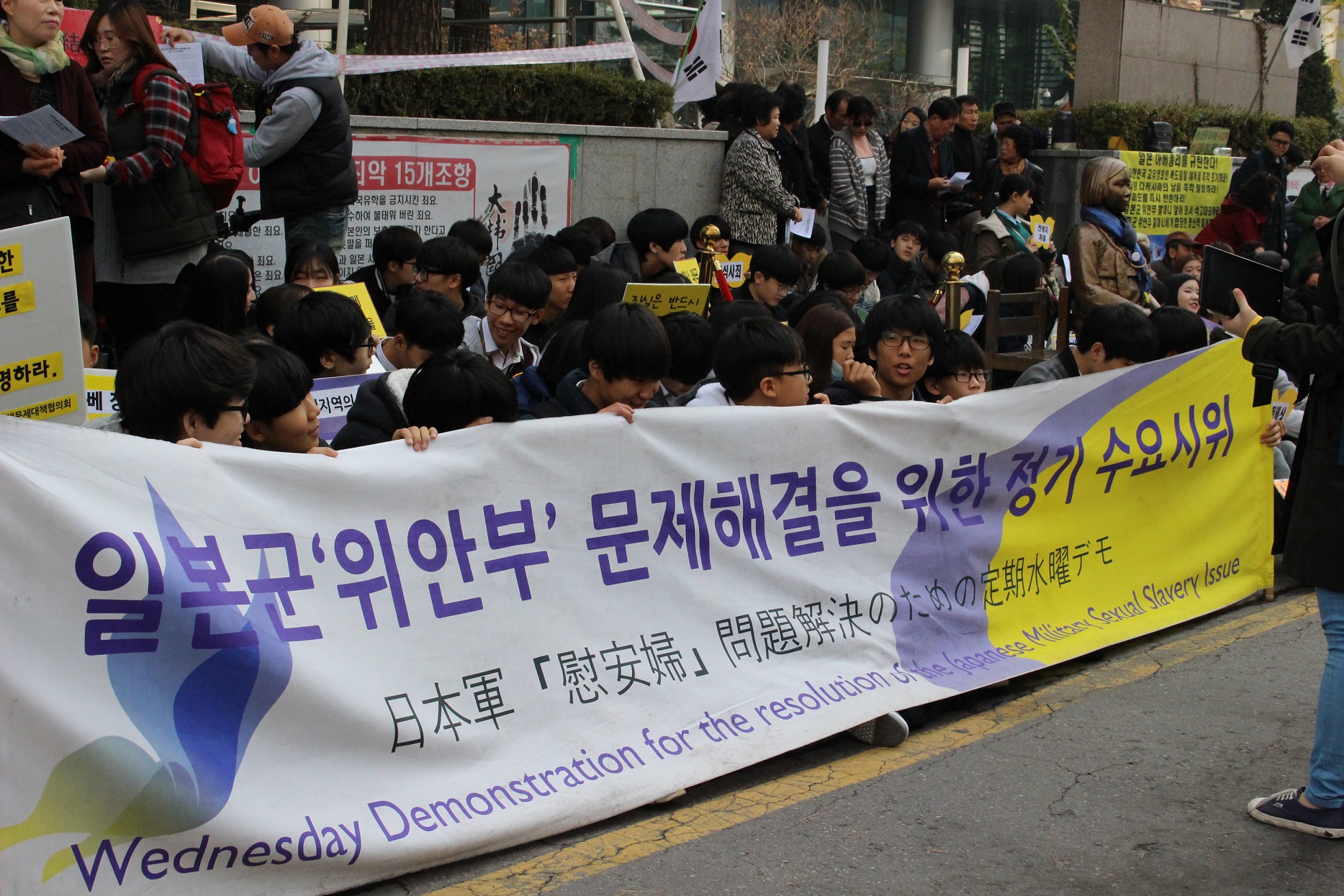 |
The victims have been demanding more than compensation for damage to their lives with small but steady protest voices. They have a list of seven requirements which include Japan recognizing their war crimes, identifying the truth, officially apologizing and legally compensating victims, punishing war criminals, recording history accurately in textbooks, and building memorials and archives to ensure this tragedy is never forgotten. Essentially, victims want a sincere apology and some long term recognition.
However, the most reviled factor of the agreement reached on December 12 was that the countries didn’t take into consideration the opinions of the victims. The agreement provides for 10 billion yen in compensation, but the country is not required to say anything else about the victims. The victims and their supporters believe the authenticity of their acknowledgment is suspect, and the nation continues to ignore the pain of the victims.
Some people believe the agreement is a positive step forward. Japan has officially admitted that their army was involved in establishing comfort women for their soldiers. They see this as a big achievement and are supportive of the agreement. Before this, the Japanese stance was that comfort women had nothing to do with their government and if they in fact existed, it was a private enterprise.
The growth of China’s economy and military will impact many countries in Asia and all over the world. This could be a good or bad thing. Some people argue that this agreement could help show solidarity between Japan and Korea in the face of China’s continued growth. They fear that as China gets stronger, they will help North Korea, which will negatively impact the south. By working together, South Korea and Japan could stand against North Korea’s nuclear weapon development program. For these reasons, putting aside old grievances would be good for both Korea and Japan.
However, opponents to the December 12 agreement argue that South Korea could work closely with China instead of Japan to help pursue a peaceful relationship with the north. Our relationship with China is very important for any possible reunification, so a partnership with them could be more useful.
The main cons of the agreement are that the government went ahead with the work without prior consultation with our comfort women. People question ‘Who agreed to the agreement?’ ‘Who is the main character of this issue?’ They argue the movie was written and produced without any main character.
Also Japan’s compensation to comfort women is with money. Comfort women didn’t fight this long to simply get money. How they can compensate those that died while still fighting for recognition and an apology? The agreement loses sight of why they took up the battle to begin with. When the compensation is received, their story will be put to bed. The battle with the comfort women will end, and people will forget about it and lose interest. It means our children, and future descendants won’t know this painful part of our history.
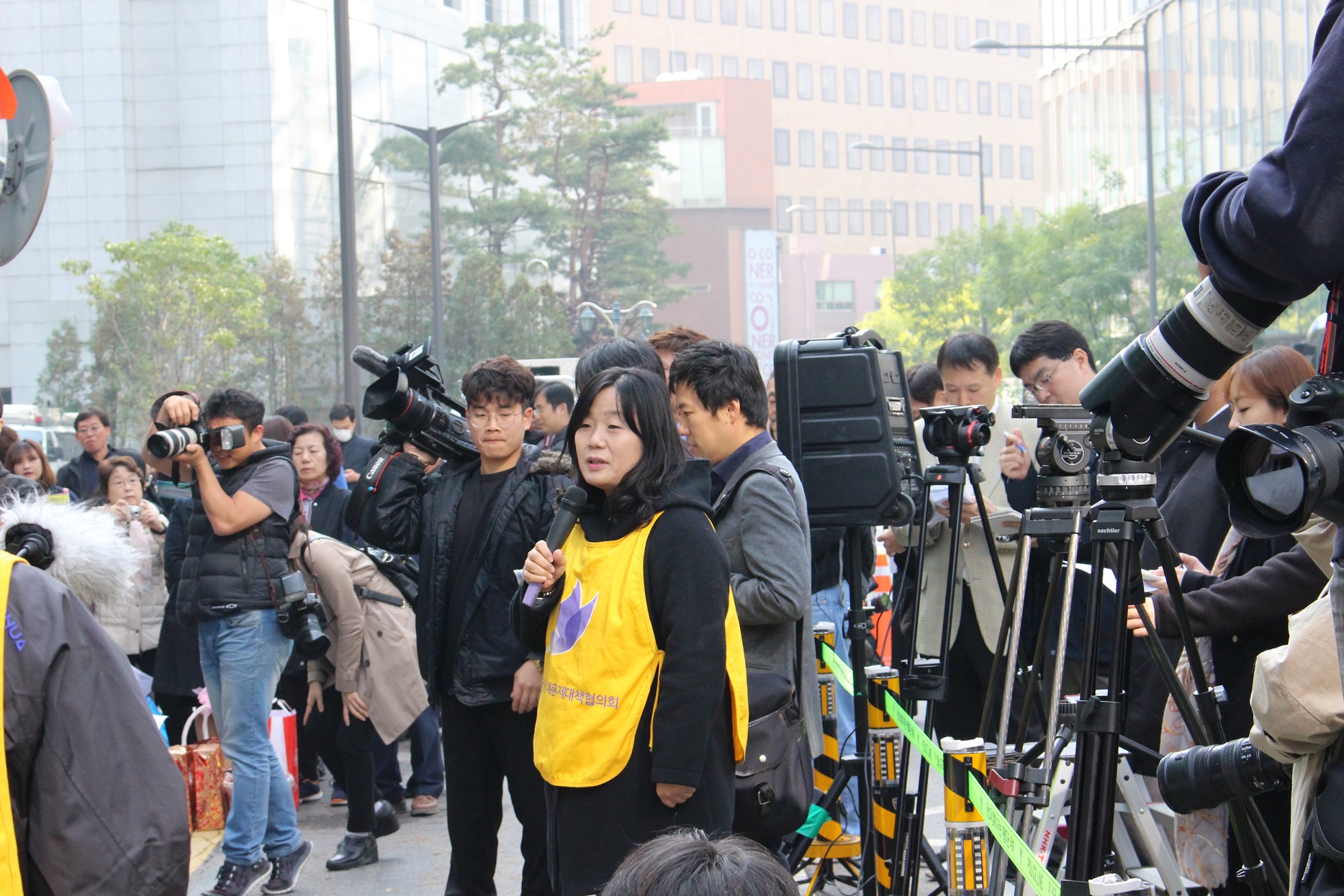 |
| ▲ Yoon Mi-hyang who is the representative at Jeong-Dae-Hyup |
The Dankook Herald (DKH) interviewed the office manager at ‘The Korean Council for the Women Drafted for Military Sexual Slavery by Japan War & Women’s Human Rights Museum’ (abbreviated as Jeong-Dae-Hyup) for more details on the problems of sexual slavery between Korea and Japan. First of all, the DKH asked about the objectives of Jeong-Dae-Hyup. They said “Our organization is trying our best to resolve the sexual slavery issue with dignity for the victims and overall peace in Asia and the world. Military sexual slavery by Japan is an unprecedented crime that was committed by the Japanese government, who coerced 100,000 to 200,000 Asian women into ‘Comfort Women’ during World War II. That’s why every Wednesday we have been holding a demonstration demanding a complete investigation and fulfillment of responsibility to restore the dignity and rights of the victims since 1992.”
Then the DKH asked about the specific activities that Jeong-Dae-Hyup has done for the victims, since there are not many victims left, considering their age. Jeong-Dae-Hyup said that they provide medical support, counseling, and a human rights campaign, because the victims’ average age is 89. The group also educates volunteers, so they can help the victims on a one-on-one basis. The organization also provides a shelter called “Our Home” for some victims that are in need of help because they are left alone.
Finally, the DKH asked their opinion of the agreement between Korea and Japan on the comfort women. Jeong-Dae-Hyup expressed strong opposition to the agreement. One of the reasons is that the apology in the agreement was not made by a diplomatic representative directly. Another reason is that the Korea’s attitude about the agreement is vague and incomplete and finally, the compensation does not go directly to the victims. They also submitted their opinion regarding the agreement to the Canadian Women’s Human Rights Education Institute stating the agreement does not represent the victim’s voice.
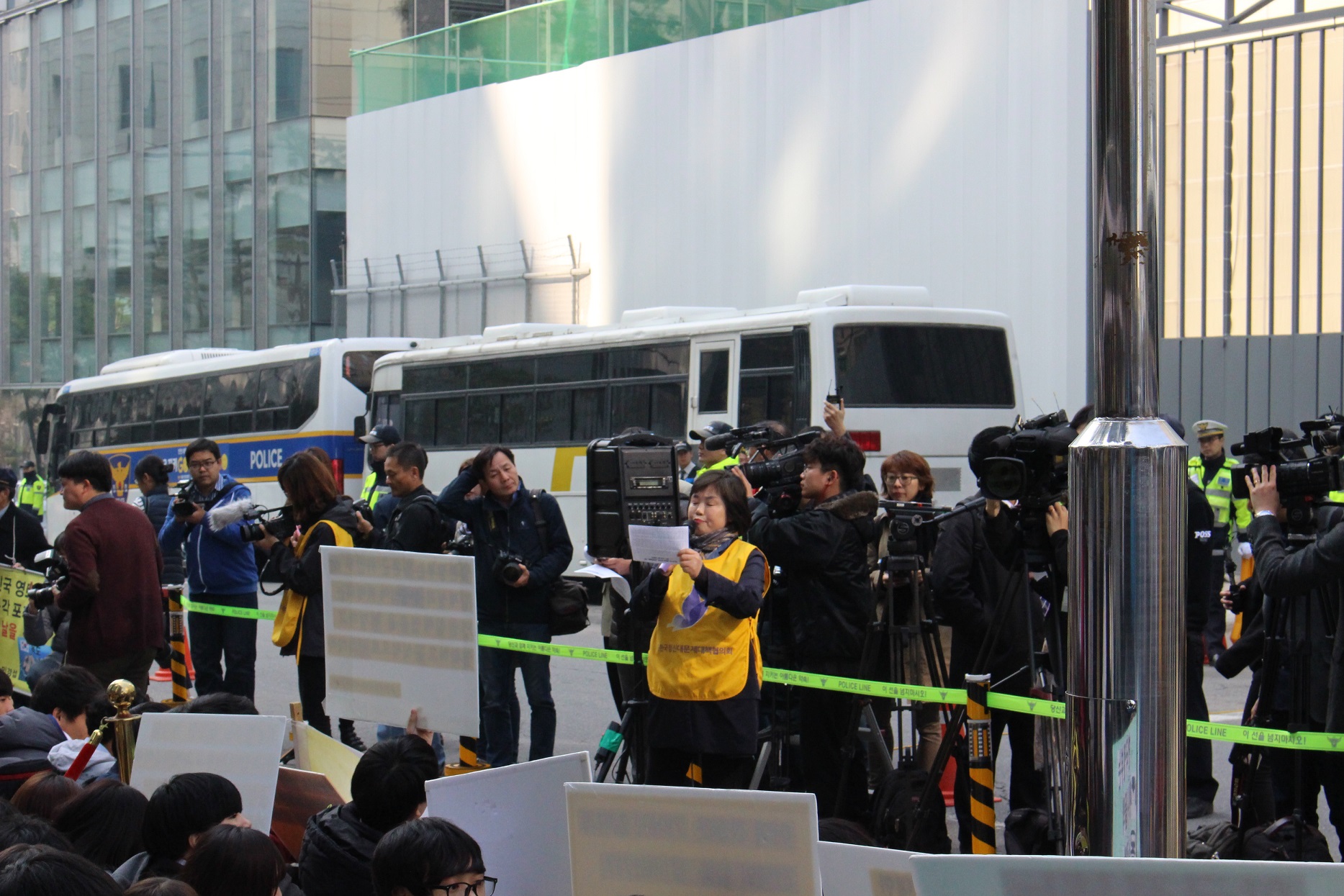 |
| ▲ Reporters who are reporting about 'Wednesday Demonstration' |
The agreement with Japan could be seen by many, including China, as a new partnership between South Korea and Japan as they begin to bury old tensions. This could lead to nations like China looking unfavorably upon South Korea. Whether you agree with reunification or not, China is a big part of that process and our stronger ties with Japan will impact their view of us.
In Korea and Japan, people need to understand the comfort women agreement and get involved in it. It doesn’t matter if you are in favor or against it, it is important to think about it and have your voice heard. This is a painful part of our history and still victims suffer from it. The agreement has been negotiated and signed, but this is not end. We have to continue to teach our children and descendants the truth about our tragic history with Japan.
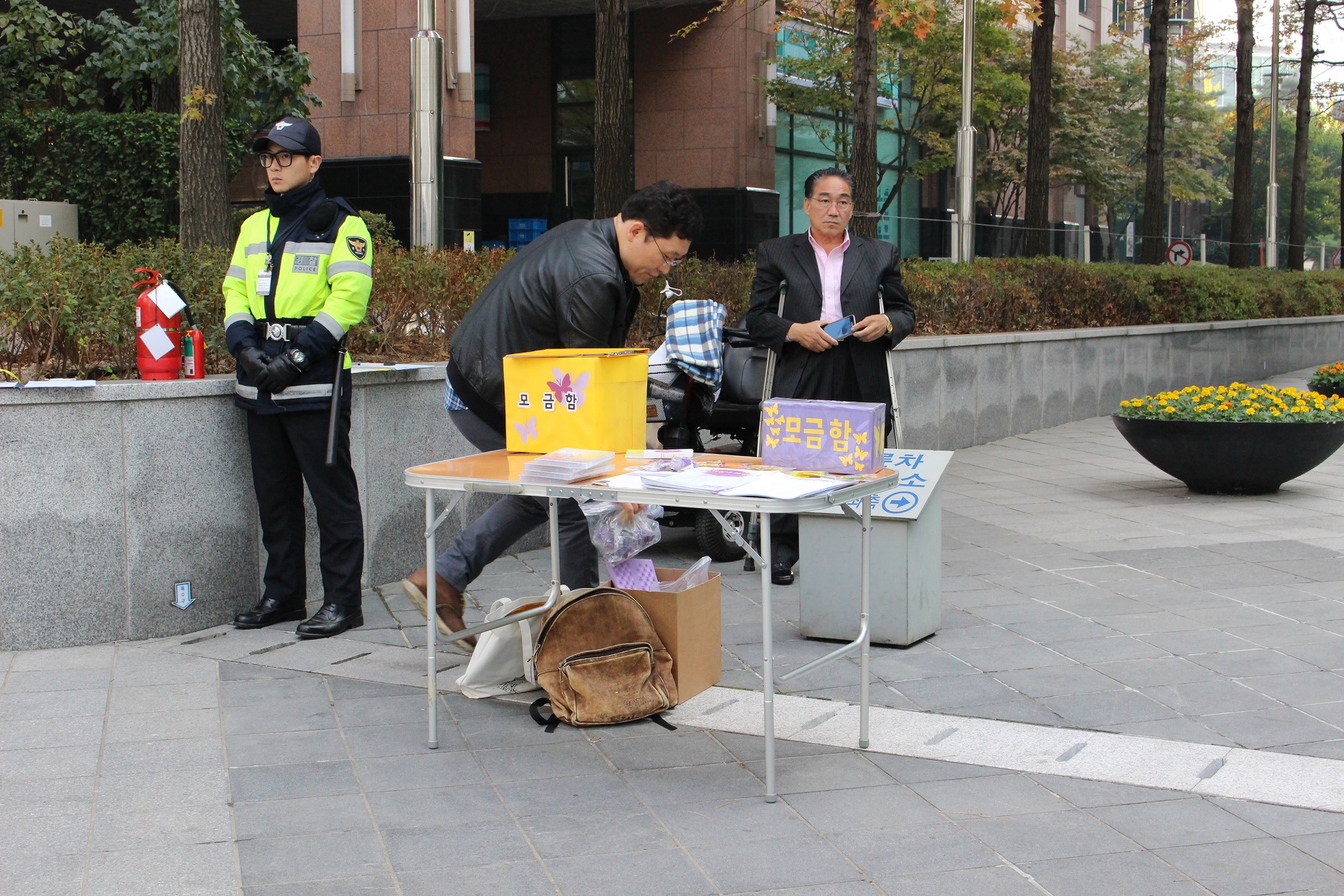 |
| ▲ A Fund-raising box which can support victims of Military Sexual Slavery |
장지원, 오수연, 윤지효 dankookherald@gmail.com

![[Campus Magnifier] Let's Surf the Library!](/news/photo/202404/12496_1765_4143.jpg) [Campus Magnifier] Let's Surf the Library!
[Campus Magnifier] Let's Surf the Library!
![[Campus Magnifier] Let's Surf the Library!](/news/thumbnail/202404/12496_1765_4143_v150.jpg)





